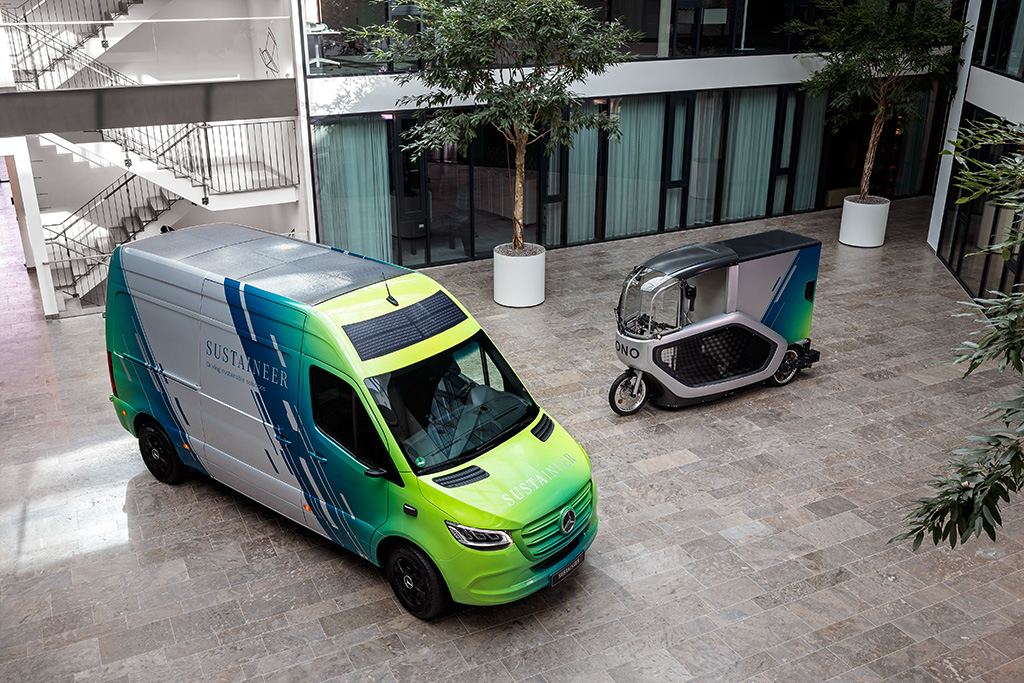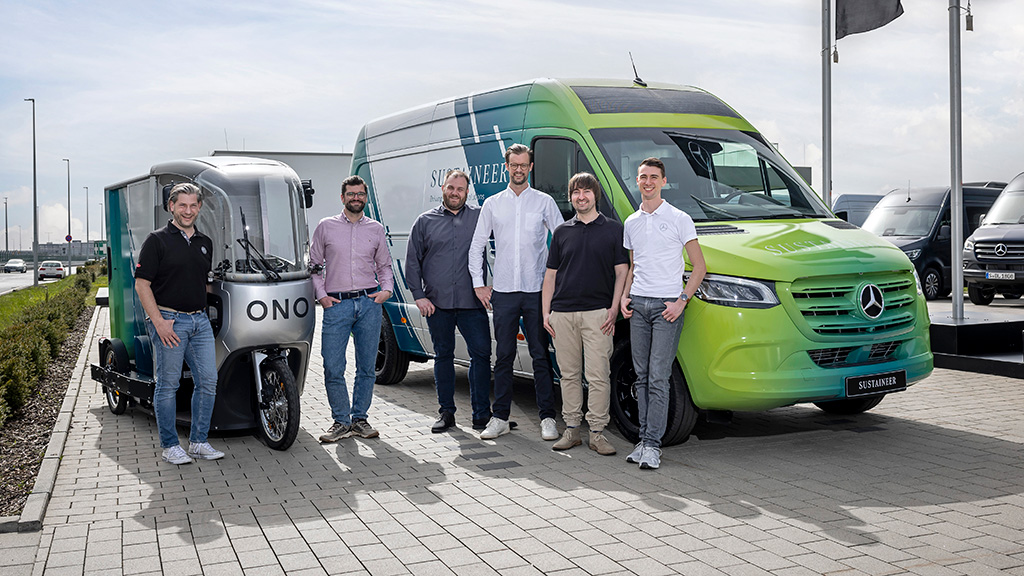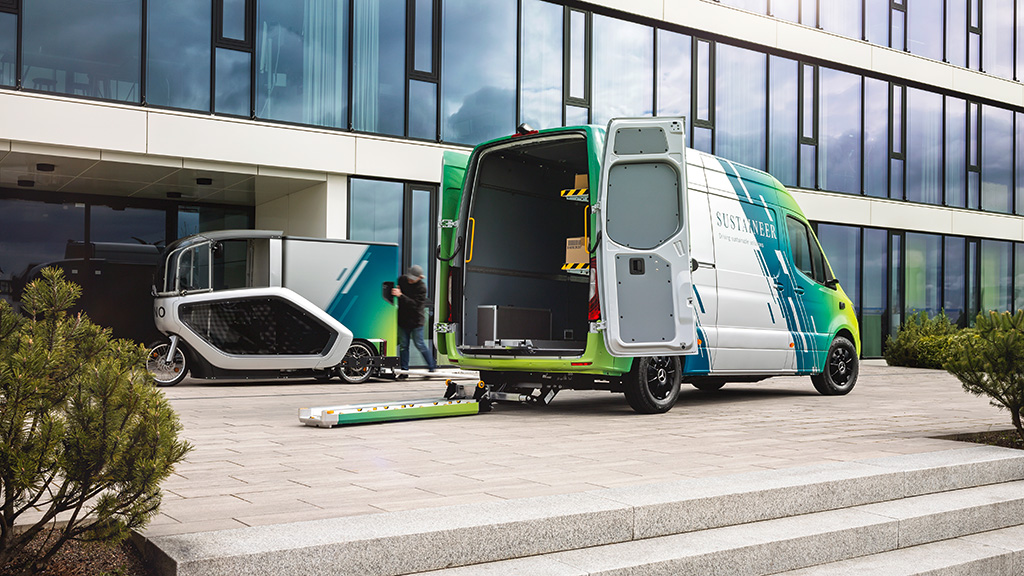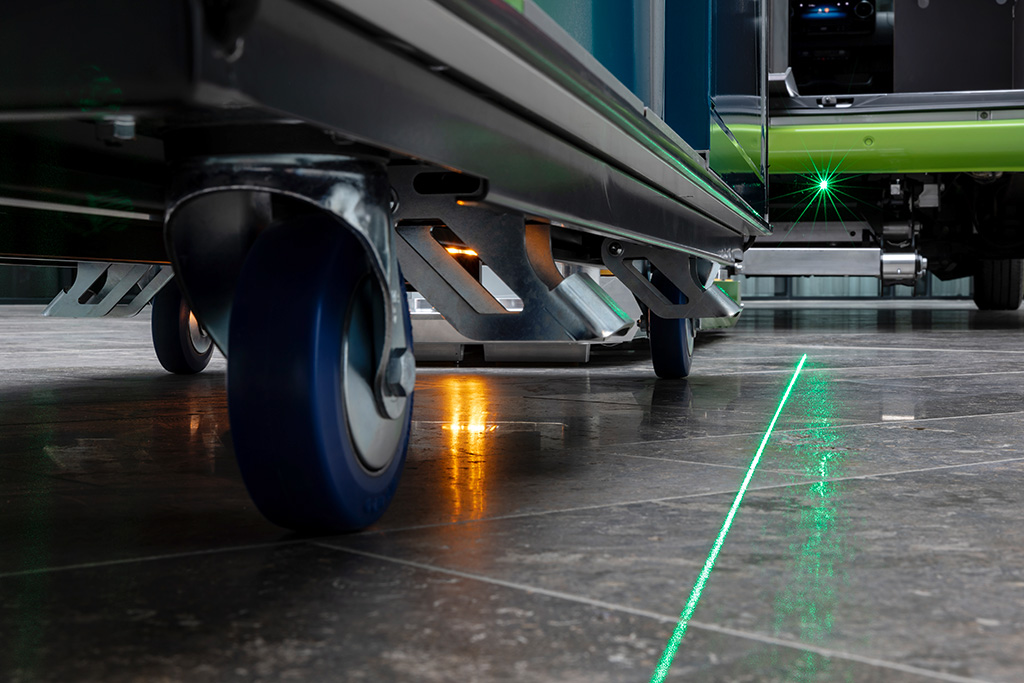ONOMOTION cooperates with Mercedes-Benz Vans for efficient solutions along the last mile

Berlin/Stuttgart, 18. April. ONOMOTION, a Berlin-based manufacturer of electric cargo bikes, and Mercedes-Benz Vans are taking last-mile efficiency to a new level with the intelligent linking of cargo bikes and eSprinter. ONOMOTION and Mercedes-Benz Vans have worked together to further develop the technology demonstrator SUSTAINEER based on the Mercedes-Benz eSprinter. With the cooperation between the SUSTAINEER and the e-cargo bike ONO, Mercedes‑Benz Vans and ONOMOTION present an efficient logistics concept for local CO2 emissions-free delivery over the last mile. The eSprinter equipped with this technology function as mobile micro-hub, transferring and exchanging pre-packed containers from ONOMOTION to ONO e-cargo bikes on the move. Thanks to the quick loading and unloading of the containers, all-electric vans and e-cargo bikes can deliver goods in parallel and meet dynamically. This considerably shortens delivery times, while at the same time helping to reduce local CO2 emissions from parcel transport.

Mobile meeting optimizes delivery over the last mile
The logistics concept utilises the features of both electric vehicles to maximise efficiency. At the logistics centre, the eSprinter is loaded with the container for the cargo bike and with large or heavy parcels for the delivery route. With a loading volume of two cubic meters and a payload of up to 200 kilograms, ONOMOTION’s container offers an optimal solution for high parcel volumes. These are loaded into the SUSTAINEER with the help of the vehicle’s integrated hydraulic lifting arm. Through the combination of the cargo bike and the eSprinter, parcels of various structures and sizes can be delivered in parallel without losing time.

En route, the eSprinter stops at specified points to transfer the containers onto the ONO e-cargo bikes. Thanks to a quick reloading process, in which the container is simply rolled onto the back of the bike and coupled, the time-consuming reloading of individual parcels is eliminated from the delivery process. The ONO e-cargo bikes then transport parcels quickly and efficiently to the recipients. In parallel, the eSprinter delivers larger parcels on its own or accepts returns.
Philipp Kahle, Co-CEO and co-founder of ONOMOTION led this project on behalf of ONOMOTION: “The partnership with Mercedes-Benz Vans marks a meaningful step towards overcoming one of the biggest challenges facing the logistics industry: reducing emissions while delivering parcels efficiently. Concepts like these, which utilise different vehicle form factors that complement each other’s strengths, point the way toward the future of parcel delivery. We’re pleased to have Mercedes-Benz Vans as an innovation partner on our side to develop these possibilities further and bring them into series production.”

Sustainability in all aspects
With the technology demonstrator SUSTAINEER , based on the eSprinter, Mercedes-Benz Vans is bringing together many innovative concepts for future delivery traffic over the last mile. All technical solutions and concepts installed in the SUSTAINEER are designed with possible series production in mind for use in future Mercedes-Benz vans. These include a solar panel on the roof, components made from recycled materials, and a mobilization seat for the driver. The newest version of the SUSTAINEER also includes close-body heating and zonal air conditioning to save energy while improving comfort in the driver’s cabin, as well as a particulate filter integrated into thefront module to reduce particulate matter emissions.
Significant cost savings, shorter delivery and waiting times, and reduced burden on traffic infrastructure
In addition to sustainability benefits, mixed fleets of e-cargo bikes and e-vans have shown the potential to significantly reduce costs for large courier, express and parcel (CEP) service providers. According to a recent study from EIT InnoEnergy, one of ONOMOTION’s investors, large logistics providers can already save up to €156M in costs today and up to €554M by 2030 through the mixed use of e-cargo bikes and e-vans, compared to a 100% e-van fleet. These savings occur despite additional costs for delivery personnel and micro-fulfilment centres.

The Mercedes-Benz SUSTAINEER logistics concept can increase those potentials further. With the eSprinter serving as a mobile micro-hub, there is no longer a need for additional city hubs, which often result in high costs for the parcel service provider. This model also reduces the number of delivery points and significantly reduces waiting times at the kerb. The e-van returns to the logistics centre faster, enabling CEP service providers to deliver more parcels per day.



